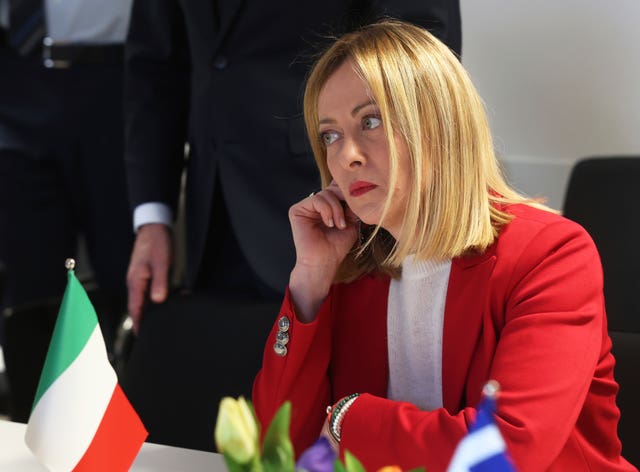World reacts with caution to Trump’s tariffs
Asian markets tumbled following the announcement by the US president.

Sweeping new tariffs announced on Wednesday by US President Donald Trump were met with measured reactions from key trading partners, highlighting the lack of appetite for a full-fledged trade war.
Mr Trump presented the import taxes, which he calls “reciprocal tariffs” and range from 10% to 49%, in the simplest terms: the US would do to its trading partners what he said they had been doing to the US for decades.
“Taxpayers have been ripped off for more than 50 years,” he said. “But it is not going to happen anymore.”
The president promised that “jobs and factories will come roaring back into our country”. He framed it not just as an economic issue, but a question of national security that threatens “our very way of life”.

Asian markets tumbled following the announcement, Tokyo’s Nikkei 225 index dipping more than 3.4% before recovering slightly.
Italy’s conservative premier Giorgia Meloni described the new 20% tariffs against the European Union as “wrong”, saying they benefit neither side.
“We will do everything we can to work towards an agreement with the United States, with the aim of avoiding a trade war that would inevitably weaken the West in favor of other global players,” she said in a Facebook post.
Brazil’s government said it was considering taking the case to the World Trade Organisation. In a rare display of unity, Brazil’s Congress unanimously passed a reciprocity bill to allow its government to retaliate against any country or trade bloc that imposes tariffs on Brazilian goods.
Some countries took issue with the White House’s calculations.
Australian Prime Minister Anthony Albanese said the US tariffs imposed on his country were totally unwarranted, but Australia will not retaliate. The US and Australia have a free trade agreement.
“President Trump referred to reciprocal tariffs. A reciprocal tariff would be zero, not 10%,” said Mr Albanese. “This is not the act of a friend.”
Mr Trump said the United States bought three billion dollars (£2.3 billion) of Australian beef last year, but Australia would not accept US beef imports. Mr Albanese said the ban on raw US beef was for bio-security reasons.
The 29% tariff imposed on the tiny South Pacific outpost of Norfolk Island came as a shock. The Australian territory has a population of around 2,000 people and the economy revolves around tourism.
“To my knowledge, we do not export anything to the United States,” Norfolk Island administrator George Plant, the Australian government’s representative on the island, said. “We don’t charge tariffs on anything. I can’t think of any non-tariff barriers that would be in place either, so we’re scratching our heads here.”
New Zealand also took issue with Mr Trump’s tariff logic.
“We don’t have a 20% tariff rate,” said trade minister Todd McClay, adding that New Zealand was “a very low tariff regime” and the correct figure was below the 10% baseline rate applied by the US to all countries.
“We won’t be looking to retaliate. That would put up prices on New Zealand consumers and it would be inflationary.”
Spared for the moment from the latest round of tariffs were Mexico and Canada, so far as goods that already qualified under their free trade agreement with the United States. Yet, the previously announced 25% tariffs on auto imports were scheduled to take effect at midnight.
Mexico President Claudia Sheinbaum said she would wait to take action on Thursday when it was clear how Mr Trump’s announcement would affect Mexico.
“It’s not a question of if you impose tariffs on me, I’m going to impose tariffs on you,” she said on Wednesday morning. “Our interest is in strengthening the Mexican economy.”
Canada had imposed retaliatory tariffs in response to the 25% tariffs Mr Trump tied to the trafficking of fentanyl.
The European Union, in response to the steel and aluminium tariffs, imposed taxes on 26 billion euros worth (£21.4 billion) of US goods, including bourbon, prompting Mr Trump to threaten a 200% tariff on European alcohol.
As Mr Trump read the list of countries that would be targeted, he repeatedly said he did not blame them for the trade barriers they imposed to protect their own nations’ businesses.
“In the face of unrelenting economic warfare, the United States can no longer continue with a policy of unilateral economic surrender,” Mr Trump said.
Speaking from a business forum in India, Chilean President Gabriel Boric warned such measures, in addition to causing uncertainty, challenge the “mutually agreed rules” and the “principles that govern international trade”.
Colombia President Gustavo Petro, who has clashed with Mr Trump before, said via X: “Today the neoliberalism that proclaimed free-trade policies all over the world has died.”
South Korea’s acting leader prime minister Han Duck-soo told officials to work with business groups to analyse the potential impact of the new 25% tariff to “minimise damage”, the trade ministry said.
China’s commerce ministry said Beijing would “resolutely take countermeasures to safeguard its own rights and interests”, without saying exactly what it might do. China has reacted to earlier rounds of higher tariffs by imposing higher duties on US exports of farm products, while limiting exports of strategically important minerals used for high-tech industries such as electric vehicles.
“China urges the United States to immediately cancel its unilateral tariff measures and properly resolve differences with its trading partners through equal dialogue,” it said.
South Korea’s Kospi index slumped 1.9% soon after opening, while in Australia, the S&P/ASX 200 fell 1.8%.
The future for the S&P 500 dropped 3% while that for the Dow Jones Industrial Average lost 2%, signalling potential losses when US markets reopen on Thursday.





